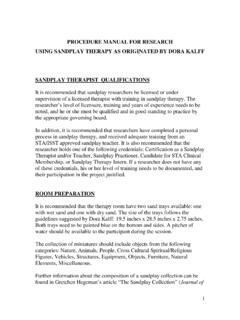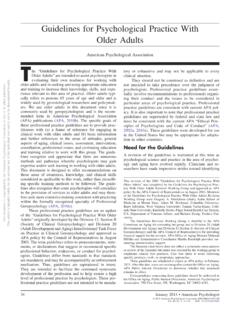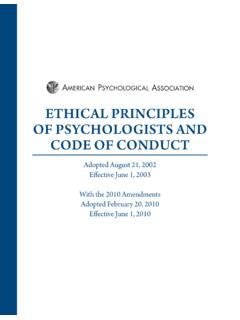Transcription of APA Ethical Guidelines for Research 8. Research and ...
1 APA Ethical Guidelines for Research8. Research and institutional ApprovalWhen institutional approval is required, psychologists provide accurate information about their Research proposals and obtain approvalprior to conducting the Research . They conduct the Research in accordance with the approved Research Informed Consent to Research (a) When obtaining informed consent as required in , Informed Consent, psychologists inform participants about (1) thepurpose of the Research , expected duration, and procedures; (2) their right to decline to participate and to withdraw from the researchonce participation has begun; (3) the foreseeable consequences of declining or withdrawing.
2 (4) reasonably foreseeable factors thatmay be expected to influence their willingness to participate such as potential risks, discomfort, or adverse effects; (5) any prospectiveresearch benefits; (6) limits of confidentiality; (7) incentives for participation; and (8) whom to contact for questions about the researchand Research participants' rights. They provide opportunity for the prospective participants to ask questions and receive answers. (Seealso , Informed Consent for Recording Voices and Images in Research ; , Dispensing With Informed Consent forResearch; , Deception in Research .)
3 (b) Psychologists conducting intervention Research involving the use of experimental treatments clarify to participants at the outset ofthe Research (1) the experimental nature of the treatment; (2) the services that will or will not be available to the control group(s) if ap-propriate; (3) the means by which assignment to treatment and control groups will be made; (4) available treatment alternatives if anindividual does not wish to participate in the Research or wishes to withdraw once a study has begun; and (5) compensation for or mon-etary costs of participating including, if appropriate, whether reimbursement from the participant or a third-party payor will be sought.
4 (See also , Informed Consent to Research .) Informed Consent for Recording Voices and Images in ResearchPsychologists obtain informed consent from Research participants prior to recording their voices or images for data collection unless (1)the Research consists solely of naturalistic observations in public places, and it is not anticipated that the recording will be used in amanner that could cause personal identification or harm, or (2) the Research design includes deception, and consent for the use of therecording is obtained during debriefing.
5 (See also , Deception in Research .) Client/Patient, Student, and Subordinate Research Participants(a) When psychologists conduct Research with clients/patients, students, or subordinates as participants, psychologists take steps toprotect the prospective participants from adverse consequences of declining or withdrawing from participation.(b) When Research participation is a course requirement or an opportunity for extra credit, the prospective participant is given the choiceof equitable alternative Dispensing With Informed Consent for ResearchPsychologists may dispense with informed consent only (1) where Research would not reasonably be assumed to create distress orharm and involves (a) the study of normal educational practices, curricula, or classroom management methods conducted in education-al settings.
6 (b) only anonymous questionnaires, naturalistic observations, or archival Research for which disclosure of responses wouldnot place participants at risk of criminal or civil liability or damage their financial standing, employability, or reputation, and confidentiali-ty is protected; or (c) the study of factors related to job or organization effectiveness conducted in organizational settings for which thereis no risk to participants' employability, and confidentiality is protected or (2) where otherwise permitted by law or federal or Offering Inducements for Research Participation(a) Psychologists make reasonable efforts to avoid offering excessive or inappropriate financial or other inducements for Research par-ticipation when such inducements are likely to coerce participation.
7 (b) When offering professional services as an inducement for Research participation, psychologists clarify the nature of the services, aswell as the risks, obligations, and limitations. (See also , Barter With Clients/Patients.) Deception in Research (a) Psychologists do not conduct a study involving deception unless they have determined that the use of deceptive techniques is justi-fied by the study's significant prospective scientific, educational, or applied value and that effective nondeceptive alternative proceduresare not feasible.
8 (b) Psychologists do not deceive prospective participants about Research that is reasonably expected to cause physical pain or severeemotional distress.(c) Psychologists explain any deception that is an integral feature of the design and conduct of an experiment to participants as early asis feasible, preferably at the conclusion of their participation, but no later than at the conclusion of the data collection, and permit partici-pants to withdraw their data. (See also , Debriefing.) Debriefing(a) Psychologists provide a prompt opportunity for participants to obtain appropriate information about the nature, results, and conclu-sions of the Research , and they take reasonable steps to correct any misconceptions that participants may have of which the psycholo-gists are aware.
9 (b) If scientific or humane values justify delaying or withholding this information, psychologists take reasonable measures to reduce therisk of harm.(c) When psychologists become aware that Research procedures have harmed a participant, they take reasonable steps to minimize Humane Care and Use of Animals in Research (a) Psychologists acquire, care for, use, and dispose of animals in compliance with current federal, state, and local laws and regula-tions, and with professional standards.(b) Psychologists trained in Research methods and experienced in the care of laboratory animals supervise all procedures involving ani-mals and are responsible for ensuring appropriate consideration of their comfort, health, and humane treatment.
10 (c) Psychologists ensure that all individuals under their supervision who are using animals have received instruction in Research meth-ods and in the care, maintenance, and handling of the species being used, to the extent appropriate to their role. (See also , Delegation of Work to Others.)(d) Psychologists make reasonable efforts to minimize the discomfort, infection, illness, and pain of animal subjects.(e) Psychologists use a procedure subjecting animals to pain, stress, or privation only when an alternative procedure is unavailable andthe goal is justified by its prospective scientific, educational, or applied value.





